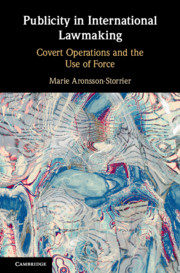Book contents
- Publicity in International LawMaking
- Publicity in International LawMaking
- Copyright page
- Contents
- Acknowledgements
- 1 Introduction
- 2 The Use of Force and the Scope for Dynamic Development
- 3 Customary International Law and the Requirement of Publicity
- 4 Quasi-Covert Operations and the Identification of Claims
- 5 Unacknowledged Operations
- 6 Concluding Remarks
- Index
6 - Concluding Remarks
Published online by Cambridge University Press: 21 January 2021
- Publicity in International LawMaking
- Publicity in International LawMaking
- Copyright page
- Contents
- Acknowledgements
- 1 Introduction
- 2 The Use of Force and the Scope for Dynamic Development
- 3 Customary International Law and the Requirement of Publicity
- 4 Quasi-Covert Operations and the Identification of Claims
- 5 Unacknowledged Operations
- 6 Concluding Remarks
- Index
Summary
This concluding chapter argues that conventional approaches addressing the development of customary international law relating to the use of force are unable to make sense of the changing practices and technologies that are explored throughout the book. It is argued that rather than focusing on an ambiguously defined requirement of publicity, practice will meet the minimum qualitative requirement as soon as it is publicly known and acknowledged. The chapter further highlights how methodological choices relating to the positioning within international lawmaking of covert operations that are publicly known contribute to the creation of spaces for a range of actors seeking to influence the development of the law. By positioning some acts as ‘outside’ of the international lawmaking process, it leaves open new opportunities to decide what the acts are, and how they should be responded to.
Keywords
- Type
- Chapter
- Information
- Publicity in International LawmakingCovert Operations and the Use of Force, pp. 162 - 168Publisher: Cambridge University PressPrint publication year: 2020



